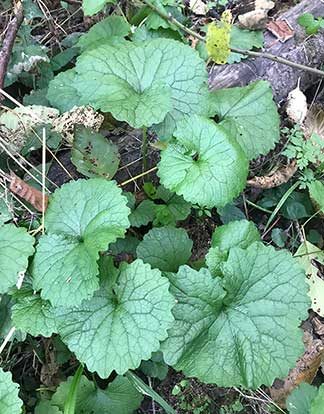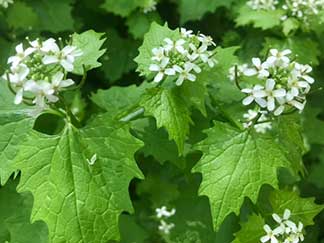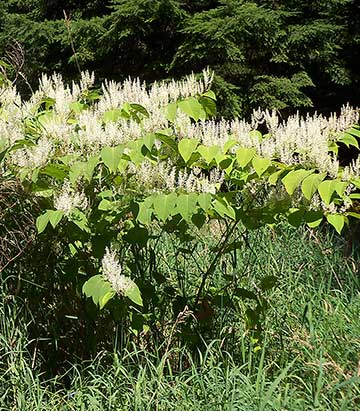 |
Previous Issues |
| Cedar Mill Community Website |
|
Search the Cedar Mill News: Search the Cedar Mill News
|
About The Cedar Mill News |
|
|||||||
| Volume 17, Issue 3 | March 2019 |
||||||
Controlling priority weeds in the Tualatin watershed
|
||||||||
 |
| Garlic mustard appears as a cluster of round leaves during the first year. |
During the first week of February, you may have received a Permit of Entry (POE) letter from the Tualatin Soil and Water Conservation District’s Invasive Species Program. This year, Tualatin SWCD took over management of the invasive species program from Clean Water Services, which has worked for the past 5-10 years to control priority weed species throughout the Tualatin Watershed, including along Cedar Mill and North Johnson Creeks.
Invasive weeds pose a danger to the environment in several ways. Their aggressive growth crowds out native plants that provide food and shelter for wildlife. They can affect drainage and other natural functions in the watershed. Left to spread, they become harder and more expensive to remove.
Management of several invasive weed species, including woody knotweed, garlic mustard, giant hogweed and purple loosestrife is provided at no cost to the landowner. Infestations of woody knotweed and garlic mustard have been found and treated on Cedar Mill and North Johnson Creeks, in addition to other parts of the watershed. Knotweed grows in the late spring/early summer and blooms around August, so you are not as likely to see it now (Photo 1).
However, springtime brings the emergence of garlic mustard, a nasty biennial herbaceous invasive that rapidly spreads by seed and emits chemicals in the soil that limits the growth of surrounding plants. In the first year of growth, garlic mustard appears as rosettes that have kidney-shaped leaves (Photo 2). In the second year of growth, the leaves are more pointed and have toothed edges. Second year plants produce four-petaled white flowers and seedpods in late spring (Photo 3).
 |
| Second-year growth of garlic mustard looks quite different. |
In April 2018, 559 patches of garlic mustard covering 0.4 acre were treated along Cedar Mill and North Johnson Creeks. Treatments consist of either hand removal or herbicide spray. Licensed herbicide contractors or Tualatin SWCD staff use backpack sprayers to apply herbicides safely. Due to annual surveying and control efforts by Clean Water Services and Tualatin SWCD, the extent of known garlic mustard infestations in the Tualatin Watershed was reduced by 94% between 2009 (75 net acres) and 2018 (4.6 net acres) While we are making headway controlling this invasive plant, more people are encouraged to participate in our program to stop new infestations from spreading and to help fill gaps in surveying and treatment.
Even if you think you do not have this invasive plant in your yard or near your creek, we still encourage you to sign and return the POE letter, since the presence of garlic mustard (and knotweed) can change year-to-year and we need to confirm its presence or absence. Please provide your phone number or email if you’d like to be notified before surveying or control work occurs.
 |
| Knotweed spreads quickly and can grow quite tall. |
If you are interested in learning how to identify these and other invasive plants, consider attending our upcoming Weed Watcher Workshop on May 21 at St. Andrew Lutheran Church, 6-8 pm. Please RSVP on our website at www.tualatinswcd.org. Attendance is limited to 30 people per workshop, so we recommend you register early. If you can’t attend this workshop, we also offer four more workshops in Hillsboro, Tigard, Forest Grove and North Bethany in late April and throughout May.
For more information about garlic mustard, please visit the 4-County Cooperative Weed Management Area website at here. Information on woody knotweed is located on the Tualatin SWCD website at https://www.swcd.net/invasive-noxious-weeds/get-to-know-the-knotweeds/. Feel free to contact either Olivia Hurd or Tyler Pedersen at 503-334-2288 Extension 111 or email info@tualatinswcd.org if you have any questions or concerns. Thank you!
![]()
Like us on Facebook for timely updates
Published monthly by Cedar Mill News LLC
Publisher/Editor:Virginia Bruce
info@cedarmillnews.com
PO Box 91061
Portland, Oregon 97291
© 2018